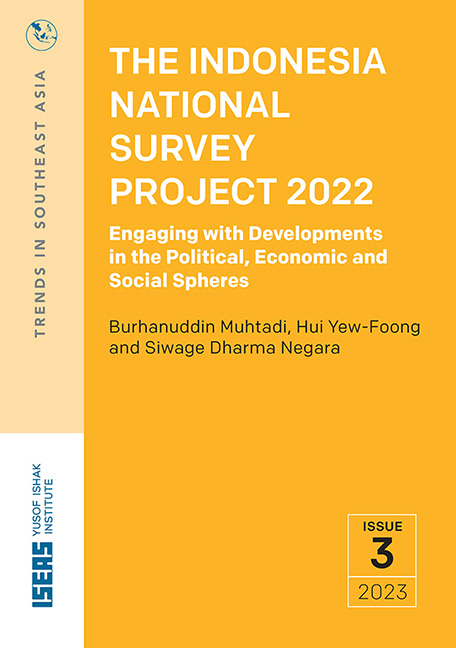 The Indonesia National Survey Project 2022
The Indonesia National Survey Project 2022 Published online by Cambridge University Press: 09 January 2024
The survey covers a wide range of issues, from politics to the economy, foreign relations, and social issues such as the role of Islam and perceptions of Chinese Indonesians. Not all questions are reported in this article, but we have given an overview of the key initial findings.
President Jokowi has a high approval rating of 71.8 per cent, and this comes from almost every segment of the socio-demographic spectrum. Exceptions include the Minangkabau, Sundanese, Betawi, Bugis and Malay ethnic communities, which is unsurprising since they constituted the strong support base of Jokowi’s rival Prabowo Subianto in the 2019 presidential election.
Public trust in state institutions is also high. As is the prevailing trend in post-Reformasi Indonesia, the Armed Forces garner the highest level of trust (89.6 per cent). This is followed by Provincial Governments (83.1 per cent), District/City Governments (81 per cent), the Central Government (80.4 per cent), and the President (78.7 per cent). Indonesians tend to be active in participating in voting, where voting in Regional Heads elections, the Legislative Election and the Presidential Election range from 89.4 per cent to 91.5 per cent. Participation in other political activities is much more limited, ranging from 3.2 per cent to 16 per cent for participation in political campaigns, volunteering for candidates, participation in demonstrations or protests, and contributing to a candidate’s campaign, etc.
One of the hot-button issues in Indonesia currently is President Jokowi’s plan to build a new national capital (IKN). While respondents who are aware of the IKN development programme are large (80 per cent), only 41.9 per cent agree with the programme, and those who rate the programme as urgent are much fewer (28.6 per cent). This indicates that the timing of the project is a concern for Indonesians, especially since the Indonesian economy is still recovering from the impact of the pandemic.
In general, Indonesians are optimistic about the economy. More respondents are likely to think that the current economic condition is better compared to the previous year, and a majority (60.1 per cent) think that the outlook of the economy in one year’s time will be better.
To save this book to your Kindle, first ensure [email protected] is added to your Approved Personal Document E-mail List under your Personal Document Settings on the Manage Your Content and Devices page of your Amazon account. Then enter the ‘name’ part of your Kindle email address below. Find out more about saving to your Kindle.
Note you can select to save to either the @free.kindle.com or @kindle.com variations. ‘@free.kindle.com’ emails are free but can only be saved to your device when it is connected to wi-fi. ‘@kindle.com’ emails can be delivered even when you are not connected to wi-fi, but note that service fees apply.
Find out more about the Kindle Personal Document Service.
To save content items to your account, please confirm that you agree to abide by our usage policies. If this is the first time you use this feature, you will be asked to authorise Cambridge Core to connect with your account. Find out more about saving content to Dropbox.
To save content items to your account, please confirm that you agree to abide by our usage policies. If this is the first time you use this feature, you will be asked to authorise Cambridge Core to connect with your account. Find out more about saving content to Google Drive.